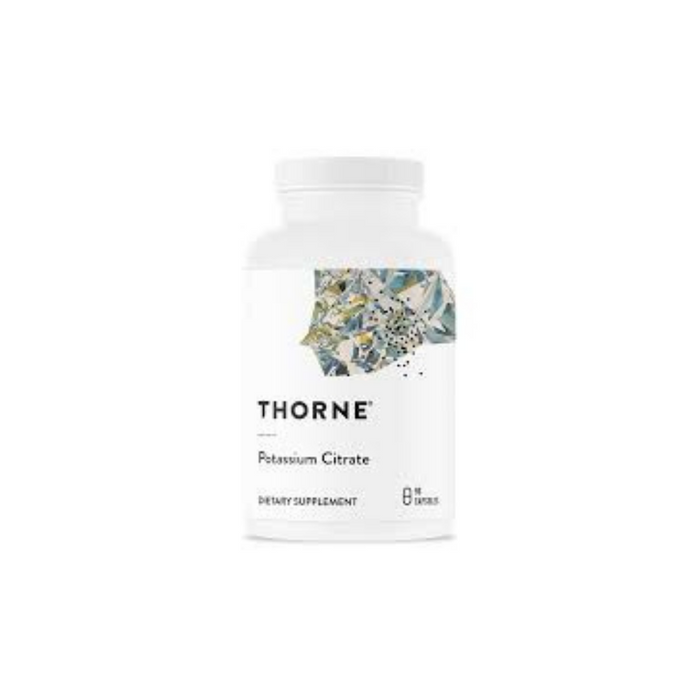
Potassium Citrate 90 vegetarian capsules
Potassium plays a vital role in the proper functioning of skeletal muscle and the heart muscle. It is essential for nerve impulse transmission, muscle contractility, and maintaining normal blood pressure, energy production, and nucleic acid synthesis. Epidemiological evidence suggests that diets high in potassium provide numerous benefits to cardiovascular health.
A chronic potassium deficiency can result in various adverse health conditions, including prolonged feelings of weakness and fatigue. Thorne's Potassium Citrate promotes cardiovascular health, and also supports kidney and lower urinary tract health by inhibiting precipitates in the urine because of its alkalizing effect. Potassium Citrate's benefit of alkalizing the urine also inhibits the growth of undesirable bacteria in the urinary tract.
Another reason to facilitate an alkaline urine is that certain botanical extracts, such as uva ursi and berberine, both of which support a healthy urinary tract, work most effectively in alkaline urine. These two botanical ingredients are in Thorne's Uristatin, which is why these two supplements pair together nicely to promote urinary tract health.
Ingredients:
One Capsule Contains:
Potassium (as Potassium Citrate) 99 mg.
Other Ingredients: Hypromellose (derived from cellulose) capsule, Microcrystalline Cellulose, Leucine, Silicon Dioxide.
Suggested Use: Take 1 capsule one to three times daily or as recommended by your health professional.
Warnings:
ALLERGY WARNING
This product is contraindicated in an individual with a history of hypersensitivity to any of its ingredients.
PREGNANCY
If pregnant, consult your health professional before using this product.
INTERACTIONS
Aspirin, laxatives, sodium bicarbonate, and several prescription medications â including trisalicylate (a pain medication), colchicine, corticosteroids, and non-potassium sparing diuretics (such as thiazide diuretics) â can induce potassium depletion.
ACE inhibitors (captopril, enalapril, ramipril, etc.) can produce potassium retention by inhibiting aldosterone in the adrenal glands. Potassium supplementation concurrently with ACE inhibitors and potassium-sparing diuretics (spironolactone, amiloride, triamterene, etc.) should be undertaken with caution to prevent excessive potassium levels in the body.




